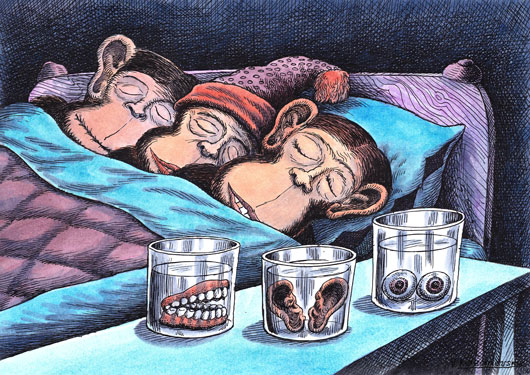[DISPLAY_ULTIMATE_SOCIAL_ICONS]

Today: Psalms 18:7-15; Matthew 21:33-46; Matthew 22:1-14; Job 25, 26, 27, 28, & 29
Matthew 21
Parable of the Landowner – In this parable, the landowner is God and his vineyard is the world. The vine-growers who lease the land are all of humanity. God has leased his creation to us; we are the current caretakers of this earth. The slaves he first sends to collect his harvest are the prophets who were rejected and sometimes murdered. Then the landowner sends his own son (Jesus, of course) but they kill even him.
Jesus is speaking to the Pharisees. There is always a noted difference between the parables Jesus tells the ordinary folks and those he relates to the Pharisees. To us regular peeps he tells stories about God’s grace and mercy. To the Pharisees he gives stories of man’s rejection of God. Interesting…
The men who kill the son in the parable represent the Pharisees who were even then plotting to kill Jesus. At first they don’t recognize themselves in Jesus’ story. They initially respond with scorn for the murderous vine-growers. Then the light bulbs turn on as Jesus elaborated. They get it. He’s talking about THEM. They’ve been duped by this tricky street preacher. And they hate him even more.
Parable of the Wedding Feast – I just love how Jesus plays mind games with the Pharisees. They were the intellectuals, the holders of truth. And here was this uneducated peasant carpenter running word circles around them.
He immediately launches into another parable about a king (God) who prepares a wedding feast for his beloved son. The king sends out his prophets to invite people to the feast. But they refuse to come. They abuse and even kill some of the invitation bearers. Again Jesus is referring to the Pharisees… digging his little barbs of truth into their bruised egos a bit further.
Jesus came humbly healing and teaching. Why did the Pharisees hate him so much? The Pharisees were used to being in charge. They held the common folks hostage with their unearned spiritual rule. Only they held the keys to God’s favor without mercy like axes over the necks of their subjects. They used God’s name to further their own evil agendas.
These Pharisees were the only people Jesus ever rebuked. They hated Jesus because he dared to question their authority. They hated him because the people loved him. The evil within them recognized that Jesus held authentic spiritual authority that they could only pretend to have. The jig was up. He knew exactly who they were. Their cover was blown and they wanted to destroy him for it. Little did they realize that they were following God’s exact plan.
Evil does have its day but rest assured those days are numbered. God will win in the end; indeed he already has won and all Satan can do is march through the trenches God has already dug for him. Evil will appear to have won some battles. It will gloat and prance and throw a terrific farcical victory parade. Evil will do its damndest to make you think you have lost. But it’s all a show.
Satan knows the Bible better than most of us. He’s read the contract. He knows his time is limited. He knows he will ultimately lose this war. So he’s attempting to wreak as much collateral damage as he can in the interim. WE are that collateral. He knows how much God loves us and he hates us for it. The only way he can get at God is by destroying us and he’s giving it all he’s got. He’s gonna throw every underhanded wicked weapon at us in his arsenal and he will never quit. And look at us… depressed, afraid, sick, distracted, addicted. It doesn’t have to be this way.
I struggled with depression for many years. I attempted suicide when I was 30 years old. I know depression. I actually did die and my spirit left my body for a short time. I saw angels who urged me to call for help. God sent angels to save me. He’s not through with me yet. And if you’re still breathing, he’s not done with you either.
Today I am completely healed from depression. I take no medications and see no counselors. Jesus has miraculously, completely healed me. THIS is the banquet that Jesus offers to us. Today he offers us his miraculous healing, peace, joy, life. Tomorrow he offers us his eternal glorious company. Take it. It’s yours. He’s offering it to you…

Job 26-29
Job and Co. spend 38 chapters arguing about whether or not Job has brought about his own suffering by committing some misdeed. His friends argue that only the wicked suffer, so obviously Job must have sinned. Their’s is a simplistic (and incorrect) world view.
Job argues that he is innocent. He knows that sometimes the innocent suffer because he is living it.
Job’s friends are also wealthy, as Job was before he lost everything. They were members of the elite circles of the day. Their arrogant point of view reflects their status. Human nature never changes. How easy it is to look down upon others from a throne of comfort. How easy it is to assume those poor sick people must have done something wrong to deserve it. Job’s friends get away with their prideful attitudes because their pampered lives allow it. Job likely thought the same as they did before God opened his eyes to reveal the truth of our current condition. Job now understood that calamity strikes the rich and the poor. Money and status save no one from suffering or death.
But there is a treasure to be had despite all of this. Job calls it “wisdom.” The “acquisition of wisdom is more valuable than pearls, the topaz of Cush cannot equal it, nor can it be valued in pure gold.” (v.28:18-19) But “mankind does not know its value, nor is it found in the land of the living.” (v.28:13) Jesus, the wisdom of God, reaches out to us, offering us a seat at his banquet table. But so few will come — preferring temporary pleasures, addictions, living death to the spiritual riches he offers. So many people will continue to laze about within their comfortable lives, rejecting Wisdom’s invitation, believing as Job’s friends did that their comfort indicates God’s favor.
Often it takes a catastrophe to blast us out of our naive slumber. Then we either blame God or we beg him for help. Job responded to tragedy by turning to God. Before his troubles, he thought his life would continue skipping happily down easy street. His suffering taught him that “the fear of the Lord, that is wisdom.” (v.28:28) Job had been given the gift of eternal vision.



